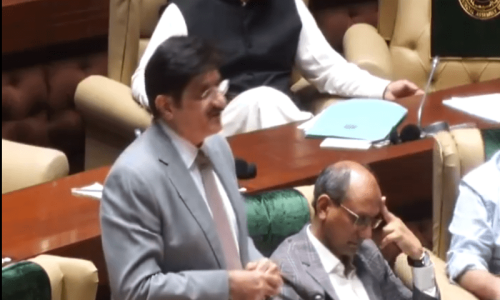KARACHI: It rained on Saturday evening. So only a handful of people were able to see the documentary Revisiting Pandit Ravi Shankar at the Alliance Francaise de Karachi. And they must be thanking their lucky stars that they did. No words can do justice to describe the experience that one had while watching the inimitable musician giving his views on his life and work, and displaying his extraordinary talent.
The documentary was a compilation of Pandit Ravi Shankar’s (1920-2012) interviews taken in different phases of his career. As should have been the case, it started with the great musician describing to a western interviewer the basics of sitar playing and the layout of the instrument. He talks about the years of training required to learn to play the sitar, and while shedding light on that, he inevitably waxes eloquent on ragas and the profound effect that they have on their players and listeners.
He tells the interviewer that ragas are specific notes based on full octave (72) scales. This leads him to touch upon the finer points of the first and second most important notes — vaadi and samvadi — in a raga.
Then the film cut to a mid-1980s Delhi TV interview. It was the most enlightening part of the documentary. Here the musician opened up about his private life more than his art. His visit to Paris when he was a teenager with his brother Uday Shankar, living a Bohemian life with a bunch of creative people, was quite a special narration. He admitted that he “saw far too much too soon”. Then World War II broke out and they had to come back to India, where he lived in completely different circumstances. And it is here that he learned a great deal from Ustad Allauddin Khan, for whom he had tremendous respect and affection. Before that, he discussed the critics in detail. He said he was criticised for having a ‘Western attitude’, for being part of the concert culture, but explained that what he merely did while living in the West that he “cut down the duration of my performances”.
Speaking about his work in the West, he especially mentioned the music that he did for Alice in Wonderland made for the BBC. When the interviewer brought up the various facets of his existence and inquired which one suited him best, he said: “I’m too many things at the same time.” As for his ambitions, he remarked the appetite of a creative artist never gets satiated.
The last bit of the documentary was black and white in which the sitar player was seen taking part in a discussion in India and playing in a concert. In between, images of his collaborations in the West, including his participation in Woodstock, are shown. It was such a delight to see them.
Earlier, Ayla Raza of The All Pakistan Music Conference, which organised the screening, gave a brief introduction of the musician to the audience.
Published in Dawn, July 17th, 2017















































Dear visitor, the comments section is undergoing an overhaul and will return soon.